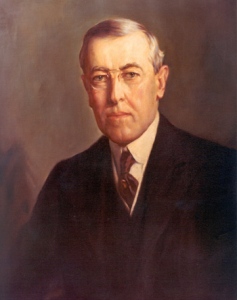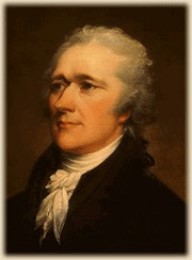Alexander Hamilton vs. Woodrow Wilson
Will the Real Father of Modern Public Administration Please Stand Up!
By Dr. Michael Popejoy
 When I was in my first semester of doctoral training, it was emphasized in scope and theory class rather directly that most experts in public administration considered Woodrow Wilson the Father of Modern Public Administration. I believed that for quite a while, but the more I became acquainted with the work of Alexander Hamilton, the more I believed we had not looked back far enough in the nation’s history to find the seminal roots of our profession and academic discipline.
When I was in my first semester of doctoral training, it was emphasized in scope and theory class rather directly that most experts in public administration considered Woodrow Wilson the Father of Modern Public Administration. I believed that for quite a while, but the more I became acquainted with the work of Alexander Hamilton, the more I believed we had not looked back far enough in the nation’s history to find the seminal roots of our profession and academic discipline.
What was the origin of many of our government institutions?
A group we refer to now as the “Founding Fathers” wrote the blueprint for the government that we manage today. Can you imagine the challenge that was faced by those that walked into a building one morning, entered what would be their offices; and then they had to design how the government would function?
Certainly the Constitution was all signed off on; but, that did not mean the government was ready to govern. Like today’s Obamacare, how many citizens had actually read the Constitution? Wilson took over an established, working government and may have incrementally adjusted it a bit. Not so for men like Hamilton and others who had to literally start from scratch to create the more perfect union. I cannot imagine staring into the abyss that was the 13 states and knowing that it was my job to create a working government.
Hamilton was the first secretary of the treasury and Thomas Jefferson was the first secretary of state with Washington as president—what a crew! They had to build a nation from those empty offices. And they did not have much time to do it. Citizens really expect a lot and right now—sort of like they are today!
Ironically, it was Hamilton that used the term “public administration” to describe his duties as a cabinet secretary. He recognized  what challenges were ahead of him and the obstacles he expected, and he got what he expected. Today, when it seems increasingly difficult to get the “best and brightest” to rise to public service, Hamilton willingly did so, and he was the best and the brightest in a small pool of qualified applicants.
what challenges were ahead of him and the obstacles he expected, and he got what he expected. Today, when it seems increasingly difficult to get the “best and brightest” to rise to public service, Hamilton willingly did so, and he was the best and the brightest in a small pool of qualified applicants.
Was he a perfect man, certainly not; he was one of the brilliant and courageous Founding Fathers, who like many of them, had his days of behaving badly. He was flawed, but who else was going to get the job done before the Revolutionary War, during the war as a combat and administrative officer, and after the war as a public administrator.
I wonder why the discipline of public administration passed over Hamilton and chose Wilson to be the Father of Modern Public Administration since many of the public institutions that any president in Wilson’s era of service were already in place thanks to the earlier efforts of Hamilton and others. Indeed, he was a very energetic administrator known to often annoy Jefferson by interfering in Jefferson’s role as secretary of state—Jefferson did not like Hamilton; nor did he like Burr either.
Historians have not really agreed on anyone that Jefferson genuinely liked or respected; more than himself. I suspect that since both Hamilton and Burr were war heroes and doubtful that they ever paid for drafts at the pubs since others picked up the tab out of admiration for two famous men. Jefferson never saw action and in fact left town on the fastest horse he could find anytime the British were coming. I suspect some envy was at play and I suspect that Jefferson had more to do with the fatal duel than has ever been developed through historical research.
After reading the many personality studies on Jefferson, I can easily believe he had a hand in that duel and in its fatal outcome since in those years, many men facing each other on the dueling field often felt that showing up was enough and ended up throwing their shot away rather than to aim true. It was clearly evident that it was Hamilton that did throw his shot away; but not Burr. The major beneficiary of the duel was Jefferson since no matter who prevailed on the dueling field, the other man would be damned for life. This left Jefferson as the towering figure in history with Washington dead, Hamilton dead and Burr left out in the cold.
Burr was so ostracized by his contemporaries; and by history, that it took Nancy Isenberg’s 2007 book Fallen Founder: The Life of Aaron Burr to rehabilitate his reputation.
So, what about Jefferson and what was his role in the sordid affair? Hamilton’s confrontational style created the back story for a duel, however, it was almost certainly Jefferson who pushed Burr into the duel and created in him the mindset to make his shot count. What do you think?
In many ways, Hamilton was a man ahead of his time, and unfortunately, he had a confrontational personality; something many great thinkers seem to have in common. His confrontational personality contributed to ending his life early in a duel with the vice president, Aaron Burr. But, were there mitigating factors that contributed to the execution of the duel in the way it was carried out?
Let’s discuss what Hamilton contributed that would qualify him as a prime candidate for the role in history of the Father of Public Administration compared to Woodrow Wilson. We might come to some interesting conclusions. What are your thoughts?
Do you think Jefferson was a factor in the duel and had influence over Burr in shooting true? What were the enduring public institutions that were created by Alexander Hamilton and should he be named the Father of Modern Public Administration?
Yes, this is counter-factual history but it is an interesting approach to understanding how we got to where we are today.
Thanks,it is always enlightening to understand the genesis of a decision taken at a particular point in time.
LikeLike
I am so new at blogging that I am probably not the best adviser on increasing readership. There are some publications around that advise on blogging. One thing I did find out was to keep it personal and speak direct to the reader rather than to write in the usual dry academic third person passive voice.
Dr. Popejoy
> Date: Thu, 24 Oct 2013 14:23:16 +0000 > To: dr_popejoy@hotmail.com >
LikeLike
Yes I can, in the near future. I am about to segway into Wilson’s illness which evidence has turned toward the Spanish Flu of 1918 that killed an estimated 100 million worldwide and probably contributed to ending WWI
Dr. Popejoy
> Date: Thu, 24 Oct 2013 14:22:37 +0000 > To: dr_popejoy@hotmail.com >
LikeLike
Can you talk about the “stateless” origins of public administration.
LikeLike
Thank you very much for publishing this kind of article. I like your article very much. I want share my website details to you please give me some information to increase performance like as your website.
LikeLike